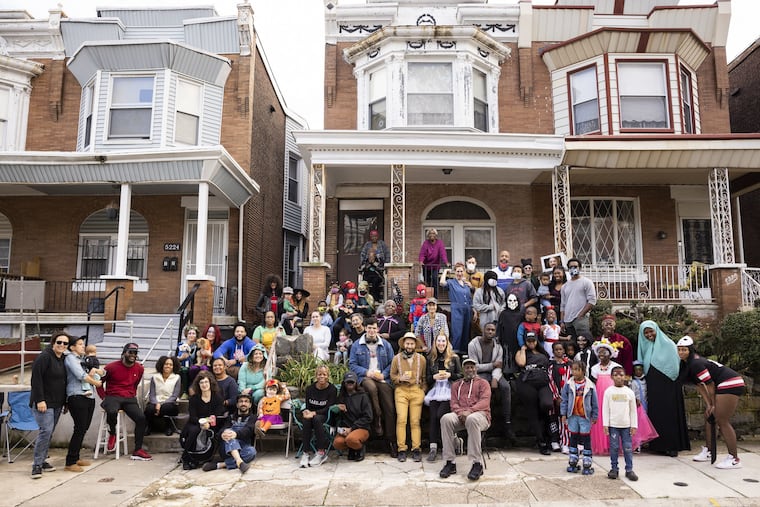Our block was one of 458 denied a block party by Philly police. Until we fought back. | Opinion
The residents of the 5200 block of Webster Street wanted to bond with a block party — until police told them they weren't allowed.

Last Sunday, our neighbors woke up early, did a street cleanup, and held out hope that the rain wouldn’t ruin our fun. It was block party day — complete with a moonbounce, a face painter, and a Halloween playlist. For hours, neighborhood kids dressed as butterflies, dinosaurs, and witches darted from the slide to the snack table, completely unaware that neighbors had to fight the Philly police to make this special day happen.
In Philadelphia, the Police Department is responsible for approving or rejecting block party applications. According to data we requested from the Streets Department, 96% of recent block rejections have been due to police concerns. Our block is one of the 458 blocks that were rejected this year alone.
The police department rejected our application because of “criminal activity.”
As lifelong Philadelphians, we are not naive. Our block has seen its ups and downs, and we are not strangers to the trauma and fear of gun violence. Waking up to the sounds of gunfire or helicopters overhead is an experience all too familiar here. Too many of our neighbors have lost loved ones to violence or prison.
But despite — and perhaps to defy — this background, we’ve built a community here on the 5200 block of Webster Street.
Neighbors meet regularly to tackle quality-of-life concerns. If the weather is nice, we’re on our porches or in our gardens. A stroll down the block in the summer is a social affair. We worked together to clean up a nuisance bar on the corner, once the site of shootings and fights. It’s still not perfect, but the bar no longer serves minors and there hasn’t been a fight or shooting in quite some time. We look out for elders by buying groceries and crowdfunding housing repairs, and we doubled the number of trees on our block.
In other words, we’ve put in time and work to build a safe space here. Our block party was another step on that journey. But in the eyes of the police department, who only know us through statistics, we are criminals unworthy of this Philly tradition.
Within hours of receiving the police department rejection, one of our neighbors tweeted about the ordeal. Her post went viral and soon we had elected officials calling our local police captain on our behalf. The police department reversed its decision, calling it an “error.” Perhaps it was an honest mistake. We can’t prove otherwise, however the numbers show that rejecting a party application in our neighborhood is far from an aberration — and not every block will have a Twitter-savvy neighbor to sound the alarm or investigative reporters to gather the data.
We live in the 18th Police District in West Philadelphia, a predominantly Black area where many of us struggle economically. Fifty-two applications for block parties in our neighborhood have been denied this year. In Southwest Philly’s 12th District, 81 applications have been rejected. In the 22nd District, which includes parts of Strawberry Mansion and Brewerytown, 54 applications were rejected.
The common link for rejections: residents of color with high poverty rates. In whiter areas of the city, the rejection numbers are in the single digits.
Three years ago, The Inquirer found that the police department barred more than 900 blocks from throwing block parties due to concerns over gun violence. The police department claims that this blanket policy no longer exists, but the numbers illustrate that the department effectively still does not allow swaths of the city to gather for neighborhood bonding festivities.
Our neighborhood, and the others where block parties aren’t allowed, has suffered high rates of gun violence in recent months and years, which is likely why the police don’t want people gathering here. However, restricting neighborhood parties is not an effective way to curb bloodshed. On the contrary, we think that city leaders should be encouraging community-building. There is nothing more Philly than a block party.
As Philadelphia endures a horrific crisis of gun violence this year — on track for 500 murders — the city should support neighbors’ ability to build the bonds that will keep us all safe. Our block and blocks like ours are the model for what our elected officials mean when they talk about community stepping up. We cannot police our way out of gun violence. The city should immediately stop allowing the police department to decide who can and cannot have block parties. Instead, our officials should commit to supporting the 458 blocks previously banned from hosting a block party with safe plans to build and celebrate community.
Bernita Henry serves as block treasurer and has lived on Webster Street for 30 years. Saxon Nelson is the block captain and has lived on Webster Street for five years.